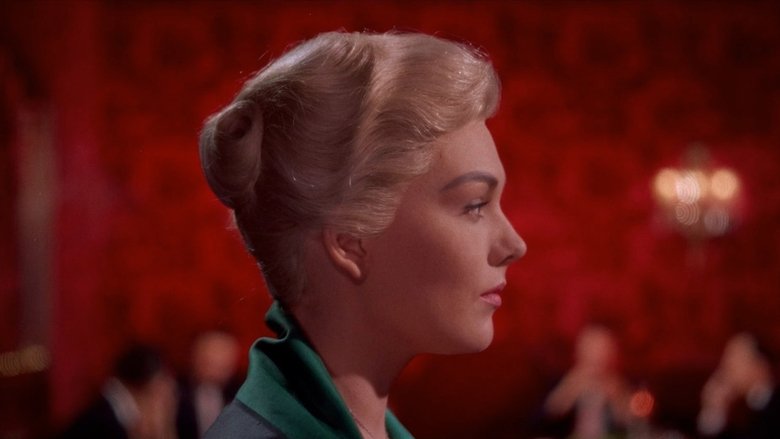← Back to Reviews

in
#307 - Vertigo
Alfred Hitchcock, 1958

A retired detective with a severe fear of heights is employed by a businessman to carry out surveillance on his eccentric wife.
I really want to like Vertigo a lot more than I already do due to it being the weirdest of Hitchcock's most widely recognised masterpieces. It starts off simply enough with its protagonist, a nervy ex-detective played by James Stewart, trying to cope with his acrophobia right as he gets a new case that simply involves tailing a woman (Kim Novak). This woman has a bizarre obsession with a long-dead ancestor and has suicidal tendencies that are somewhat rooted in said ancestor's own history, which causes Stewart's character to become more than a little intrigued and involved than is professionally acceptable. Going into more detail than that would seem too reliant on spoilers, but it's interesting because the spoilers would come less from the revelation of plot details than from the film that develops around them. Vertigo differs from the other great Hitchcock films in how it seems virtually unconcerned with any actual development of its plot. Sure, it's got a very noir-like set-up that hits a lot of familiar beats - a damaged detective, his sarcastic secretary, a suspicious client, a supposed femme fatale, etc. - but its a credit to Hitchcock and his collaborators that all these clichés get subverted in service to the film's concern with something greater than delivering a rollicking mystery (which only really starts halfway through the film and then gets the truth revealed to the audience two-thirds of the way through the movie, but it's still up to us to watch Stewart figure it out for himself).
Aside from giving us the famous "vertigo" effects work, the film is also reasonably visually competent and reliant on powerful imagery to communicate its themes, such as Stewart's dream sequence in the second half of the film. He and Novak give good performances (especially the latter as she is made to play two very distinct characters over the course of the film, communicating icy disconnect and complicated ferocity). Hitchcock regular Bernard Herrmann also creates a solid score to go along with the visuals on display. What stops me really liking this one is that it's maybe a bit too long for its own good - it does space its most interesting scenes a bit too far apart and still builds itself off a rather basic detective narrative, plus it doesn't stick the ending as well as it could have. It's an interesting cinematic experiment and that does make it theoretically more compelling than Hitchcock's much more prosaic classic, but this particular experiment doesn't provide the best results.
Alfred Hitchcock, 1958

A retired detective with a severe fear of heights is employed by a businessman to carry out surveillance on his eccentric wife.
I really want to like Vertigo a lot more than I already do due to it being the weirdest of Hitchcock's most widely recognised masterpieces. It starts off simply enough with its protagonist, a nervy ex-detective played by James Stewart, trying to cope with his acrophobia right as he gets a new case that simply involves tailing a woman (Kim Novak). This woman has a bizarre obsession with a long-dead ancestor and has suicidal tendencies that are somewhat rooted in said ancestor's own history, which causes Stewart's character to become more than a little intrigued and involved than is professionally acceptable. Going into more detail than that would seem too reliant on spoilers, but it's interesting because the spoilers would come less from the revelation of plot details than from the film that develops around them. Vertigo differs from the other great Hitchcock films in how it seems virtually unconcerned with any actual development of its plot. Sure, it's got a very noir-like set-up that hits a lot of familiar beats - a damaged detective, his sarcastic secretary, a suspicious client, a supposed femme fatale, etc. - but its a credit to Hitchcock and his collaborators that all these clichés get subverted in service to the film's concern with something greater than delivering a rollicking mystery (which only really starts halfway through the film and then gets the truth revealed to the audience two-thirds of the way through the movie, but it's still up to us to watch Stewart figure it out for himself).
Aside from giving us the famous "vertigo" effects work, the film is also reasonably visually competent and reliant on powerful imagery to communicate its themes, such as Stewart's dream sequence in the second half of the film. He and Novak give good performances (especially the latter as she is made to play two very distinct characters over the course of the film, communicating icy disconnect and complicated ferocity). Hitchcock regular Bernard Herrmann also creates a solid score to go along with the visuals on display. What stops me really liking this one is that it's maybe a bit too long for its own good - it does space its most interesting scenes a bit too far apart and still builds itself off a rather basic detective narrative, plus it doesn't stick the ending as well as it could have. It's an interesting cinematic experiment and that does make it theoretically more compelling than Hitchcock's much more prosaic classic, but this particular experiment doesn't provide the best results.
